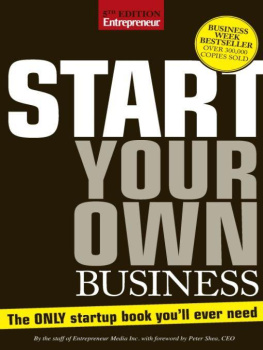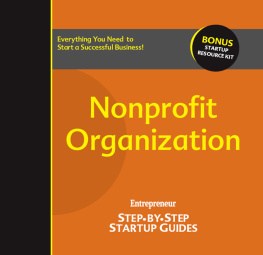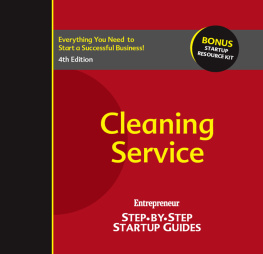Table of Contents
INTRODUCTION
THE FUNDAMENTALS OF HAVING A HOMEBASED BUSINESS
Today, tens of thousands of people are considering starting a homebased business, and for good reasons. On average, people can expect to have two and three careers during their work life. Those leaving one career often think about their second or third career move being to their own home. People who have been part of the traditional nine-to-five work force and are on the verge of retiring from that life are thinking of what to do next. The good news: Starting a homebased business is within the reach of almost anyone who wants to take a risk and work hard.
This book tells you about some of the most commonly successful homebased businesses that dont take a lot of capital to start. It includes a few that arent so common, but also have success written all over them.
But before you get too excited, there are many things to mull over before deciding to combine your home and your workplace.
THINGS TO CONSIDER
Other Household Members
The first thing to consider before you set up shop at home is the feelings of the people with whom you live. How will your business idea impact their day-to-day life? How will your being at home a lot of the time change the household dynamic? Will the space you need for your business interfere with daily activities at home?
This is when you need to sit down and have that family meeting, Brady Bunch style. Lay your plans out on the table. Find out what the others think; this is a big deal for the family, and most people feel better about changes if they are consulted first.
If you have a spouse and two more young children, the impact is going to be greater than if it is just you. But many people choose to start a homebased business when they have young children because working at home allows you to work around the kids schedules, making sure someone is always home when they are.
Other people wait until children are more self-sufficient or on their way to college before setting up shop at homethat empty bedroom looks like an appealing place for a home office!
Whomever is in the householdspouse, children, parentsbe sure to consult them before making your final decision.
Space
A next big consideration is space. Do you have the space at home to do the work you are thinking about doing? Will you need a separate room, or will a corner of the living room or that alcove off the kitchen be enough? Do you need storage space? Is there room in the garage or a shed that you could use for storage? Will you need an office with a separate client entrance or will you go to them almost 100 percent of the time?
Because we will be discussing businesses you can start for under $5,000, building an addition onto your house or renovating half the garage into a workspace does not make fiscal sense when you are starting up. Many homebased businesses need nothing more than an office space that can accommodate a computer workstation. Keep in mind that if you plan to take a tax deduction for your home office, your workspace cannot be used for anything but your business.
Insurance
You need to check your homeowners insurance policy to determine if the business you are planning to start is covered under your policy. Check that your business equipment replacement costs are covered. If your business requires that clients come to your home office, check that this is covered under your homeowners insurance plan. You may find you need separate riders for some specifics about your business that your homeowners policy does not cover.
Zoning
One of the most common mistakes people make is assuming that because their neighbor has a homebased business, the zoning must be OK for any homebased business. This is far from the truth.
First, your neighbors business may not be legal under the zoning guidelines. Just because someone has a business in their home doesnt mean they are following the rules. Second, your business may fall under a different set of rules than your neighbors business. And finally, lots of people are surprised to learn that zoning can be different at one end of a road than the other.
But dont get too alarmed; you probably dont need to be in a commercial zone to have your business. Most towns have zoning laws that accommodate low-impact home businesses. If your business doesnt generate significant traffic to your small residential neighborhood or if there arent environmental considerations, even neighborhoods that are zoned residential often allow homebased businesses. Other zoning regulations include signage, driveway requirements, and considerations specific to your town. You need to research and follow local regulations for every aspect of your business.
The bottom line is that it is important to check the zoning laws for your specific location. You dont want to go to the trouble of starting your business to find out it is illegal to have it in your home.
Mileage
Several of the businesses listed in this book require some kind of transportation to get you from your home to the client. This can be your personal vehicleyou wont be able to buy a specific business vehicle and keep your startup costs under $5,000!
Using your personal vehicle is fine. However, to keep the IRS happy, be sure to keep a travel log of all the mileage you put on your personal vehicle for your business. You will want to record the date, the starting mileage, the ending mileage, where you went, and why you went there. When tax time comes around, youll add up the miles and use that total to compute the expense you can to write off as business mileage.
If you need a vehicle for a more substantial business use than just getting from here to theresuch as a van with storage space or a pickup truck for haulingyou should consider leasing. Your lease payments are tax deductible if your leased vehicle is used strictly for business. Because you can often get a lease with a very low down payment, you wont need to trade in your personal vehicle, and keep business and personal travel completely separate.
HOW THIS BOOK IS ORGANIZED
In the following pages, you will find 55 homebased businesses to consider. Each business idea starts with some opening information, including a little about the business idea in general, what kind of special training or experience you might need to be successful, and several ways you can specialize in that particular business category. Under each listing you will also find discussions on the following categories.
How This Business Impacts Your Home
This section talks about what kind of impact this type of business may have on day-to-day life at your home. Will you need to have an office where the door locks to keep your clients tax records safe? Is it important for the type of business you are opening that clients come to your office and that they arrive to a beautifully landscaped yard? This section helps you think through the reality of your home with its new business in it.
Things to Consider
This section is intended to point out things about each business that you need to keep in mind, such as: you will need lots of inventory storage space, or this business is physically demanding, or to succeed you will need to have worked in the industry and have lots of potential clients, etc.








